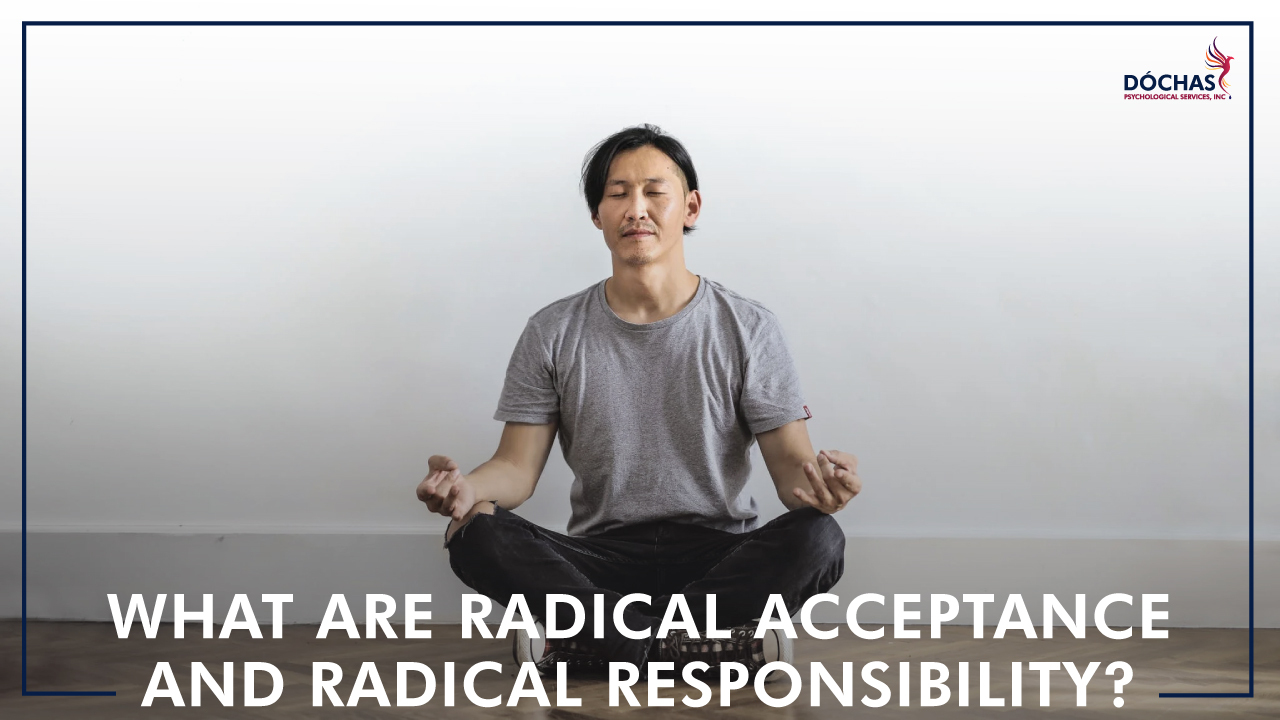Hello! Today it’s Kassandra here on the Dóchas blog, and I’d like to talk about radical acceptance and radical responsibility.
Life can sometimes throw us situations that we are not ready to deal with. We may engage in denial, the “should haves” or blaming. In reality, these defence mechanisms aren’t always the most helpful for the situations we face. So what strategies can help? They’re called radical acceptance and radical responsibility.
What is Radical Acceptance?
Radical acceptance is when you accept the reality of the situation rather than fighting it.
When you accept a situation for what it is, you stop responding with impulsive or destructive behaviours when things aren’t going the way you want them to. This practice releases the resentment that may be keeping you stuck in a cycle of suffering.
Radical acceptance is a concept developed by Dr. Marsha Linehan in her treatment approach known as DBT (Dialectical Behavior Therapy).
What Does Radical Acceptance Look Like?
A basic example of radical acceptance is to imagine that you dropped your car off to get serviced and they misplaced your car keys. You can choose to dwell in your anger and frustration, asking “why today?” or yell at the person trying to help you, or you can work to “radically accept” the situation. This means recognizing that you just cannot change it. And then moving on to recognize the anger and frustration that you feel.
Radical acceptance in this situation can help you to shift focus from unproductive thoughts to better use of your time and energy. For instance, in this situation I might acknowledge that the situation is frustrating and mindfully accept my emotional reaction, and then think about how I can use this time to benefit me (for example, playing a meditation or calling a friend).
Putting Radical Acceptance into Action
Okay, so you might grasp the concept—but the challenge is putting it into action. Here are some steps that can help you practice radical acceptance:
- Observe that you are questioning or fighting reality.
- Remind yourself that there are causes for the reality.
- Practice accepting with the whole self (mind, body and spirit). For example, try using positive self-talk, breath work or yoga.
- Practice opposite action—doing the opposite of what you would normally do.
- Allow for difficult feelings to arise in you (such as sadness, anger or grief).
- Create a pros and cons list if you are resistant to practicing acceptance.
(Source: Linehan, Marsha M. DBT (R) Skills Training Handouts and Worksheets, Second Edition. 2nd ed., Guilford Publications, 2014.)
What is Radical Responsibility?
The second “radical” concept that can be very helpful is radical responsibility. When we choose to take responsibility for our circumstances we erase the need to blame others. Yes, bad things happen to us and that is not within our control. However, we do have the ability to take responsibility for how we deal with this event.
Some of the areas that are within our control can include establishing boundaries, self reflecting or seeking help to work through those unpleasant feelings. In other words, radical responsibility is taking 100% ownership of your life and circumstances instead of blaming others.
This might sound to you like shouldering a big burden of blame, but that’s not at all what radical responsibility is meant to be. It’s not about blame, but about recognizing the choices available to you, and taking the choices that empower you.
What Does Radical Responsibility Look Like?
For example, if I’ve always struggled with weight, I may blame others for enticing me to “cheat” on my diet, being tired or not having enough time. When I practice radical responsibility for my health circumstances, I recognize that I have made choices that have impacted my state. I also recognize that I have CHOICE on how to change my current state.
How Do You Practice Radical Responsibility?
- Self reflect: take inventory of your different life domains (mental, physical, spiritual, emotional, financial, connections).
- Be honest and kind to yourself as you reflect.
- Stop blaming others, circumstances or yourself. Blame doesn’t help situations
- Commit to staying on a path of responsibility.
- Stop and reflect before making a decision. Recognize that you are able to make empowering choices or disempowering choices.
- Take action. Small actionable steps will help you reach your goals.

Hopefully some of these steps help you on your path as you navigate life’s challenges! Take it one small step at a time. If you would like a professional helping hand as you explore radical acceptance and radical responsibility, Dóchas Psychological Services is here to help. You can reach out to us at info@dochaspsych.com or by calling 780 446 0300.
Resources:
The Importance of Practicing Radical Acceptance
Linehan, Marsha M. DBT (R) Skills Training Handouts and Worksheets, Second Edition. 2nd ed., Guilford Publications, 2014.
About Dóchas Psychological
Dóchas Psychological Services is a well-established and trusted therapy clinic located in Spruce Grove, Alberta. At Dóchas we value the idea that everyone deserves a safe space. Through connection and education, our team works hard to build a trustworthy relationship with each of our clients. It is our goal to create a community for our clients to feel like they belong.
Disclaimer
Information provided through Dóchas Psychological Services blogs or vlogs is meant for educational purposes only. They are NOT medical or mental health advice. You can read more about our disclaimer here.










